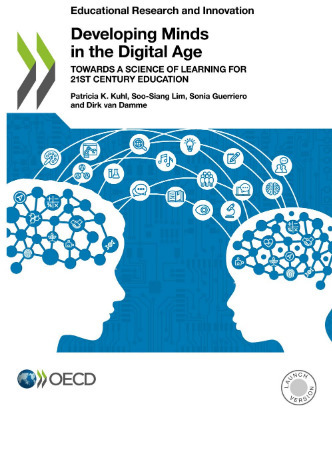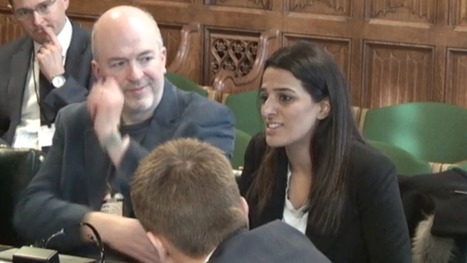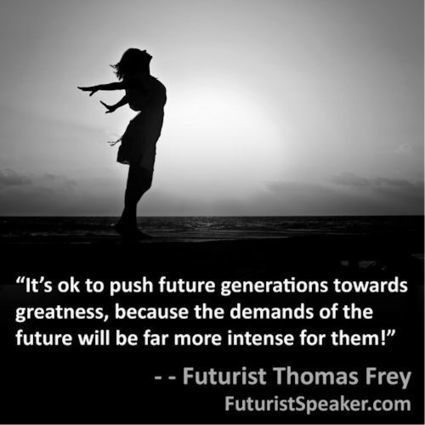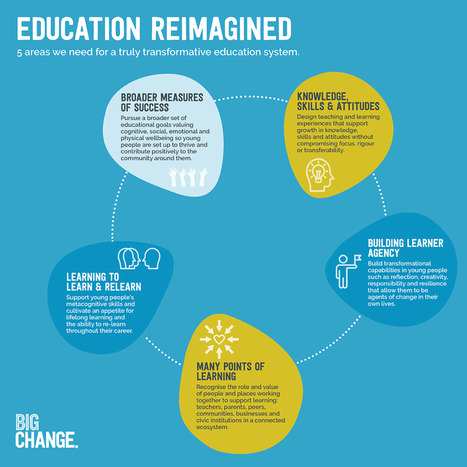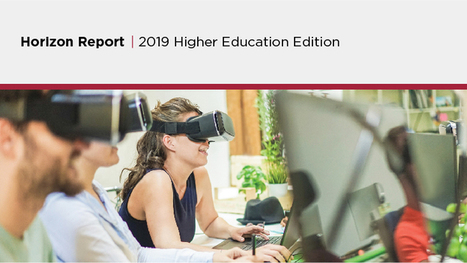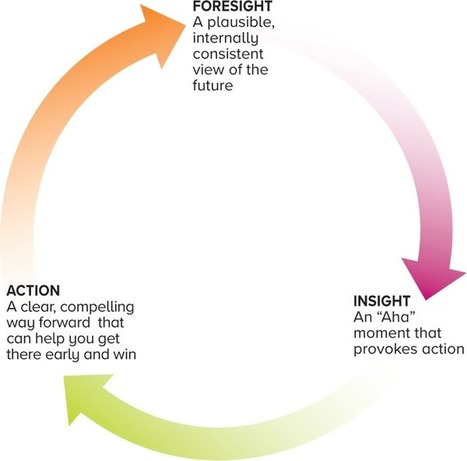 Your new post is loading...
 Your new post is loading...
Teachers want to control student learning. But, they can’t. And when they try, they hurt student learning. Letting go takes work and faith.
30 Jan 19. Everything you need to know about the Global Education Technology Market in 10 charts
Future Trends in Technology and Education is a monthly report. It surveys recent developments in how education is changing, primarily under the impact of digital technologies. Its purpose is to help educators, policy-makers, and the public think about the future of teaching, learning, research, and institutions.
Every month FTTE aggregates recent developments, checking them against previously-identified trendlines. As certain trends build in support and significance, the report recommends watching them for future impact. FTTE also notes trends which appear to be declining in significance.
Inquiry-based learning emphasises a student’s role in the learning process and asks them to engage with an idea or topic in an active way, rather than by sitting and listening to a teacher. The overall goal of an inquiry-based approach is for students to make meaning of what they are learning about and to understand how a concept works in a real-world context.
Developing Minds in the Digital Age Towards a Science of Learning for 21st Century Education
DOI:https://doi.org/10.1787/562a8659-en
This book highlights new scientific research about how people learn, including interdisciplinary perspectives from neuroscience, the social, cognitive and behavioural sciences, education, computer and information sciences, artificial intelligence/machine learning, and engineering.
I’m just going to lay my cards on the table: I believe the instructional approach at the core of virtually all available learning products is largely inadequate for engendering the type of deep, transferable, and complex learning we want to impart to students. It simply doesn’t support the acquisition of the integrated set of cognitive strategies, affective dispositions, and foundational skills necessary to be a successful and flexible problem-solver, self-direct learner, and critical thinker.
As schools focus on building students’ capacity to learn and solve problems outside the formal classroom, many educators have embraced “design-thinking” strategies as a promising approach. The appeal of design thinking, which evolved out of strategies to improve product design, is that it fosters brainstorming and collaboration skills that are valuable in a changing world where many challenges don’t have textbook answers.
New "digital CVs" that record a pupil’s knowledge and skills will “destroy” high-stakes exams, an artificial intelligence pioneer has told MPs.
Priya Lakhani, the founder of edtech company Century Tech, warned that unless the government took action, such “micro-credentialing” could be developed by companies without the input of education specialists.
Giving evidence to the Commons Education Select Committee’s inquiry on the fourth industrial revolution this morning, she told MPs that “the government does not understand artificial intelligence in education”.
The 21st century has brought about changes in every aspect of life through ubiquitous technology and Internet-based social media. The distances between cultures and continents have narrowed, the world has become flat, and multicultural work-teams composed of members from different countries have become a daily reality in global businesses. However, in many ways these global changes in work practices have only just begun to have an impact on education.
Abstract How will higher education institutions have to position in order to prepare future graduates for the changing society and future work place? The Future Skill Report is based on a number of prior research studies on future skills – future learning and future higher education. It presents validated concept and elaborates a model of future skills, data on future learning and consolidated scenarios for future higher education. With fundamental changes in the job market and challenges in our societies due to a global and technological drivers, research on future skills becomes increasingly relevant. However, many studies fall short on capturing the effects which technological advancements and global cooperation have today and will have in the future on higher education systems, skill development demands and labour market changes. They often reduce future skills directly to digital skills, which – as important as they are – only represent one side of the future skill coin. The results presented from this Delphi survey are taking a broader view and go beyond digital skill demands. The approach elaborates on an experts’ informed vision of future higher education (HE), taking into account the demand for future skills, outlines the four signposts of change which will shape the learning revolution in higher education and presents a first model of future skills for future graduates. It is part of an overarching research project series on “Next Skills” ( www.nextskills.org) and collates opinions from an international experts’ panel of almost 50 experts from higher education and business. Experts were asked both, the degree of relevance, as well as the timeframe of adoption for future skills, future higher education scenarios and the driving pillars of change.
The future will require they be better at virtually everything – smarter, quick to adapt, high energy, work long hours, durable, and much more resilient when things go wrong. Yet we’ve been doing just the opposite, instilling a sense of frailty, trying to protect them from everything that can possibly go wrong. Keep in mind, a great captain is never made from calm seas.
As transgressions of civility by business leaders come to light—the fraudulent account scandal at Wells Fargo, the toxic work environment at Uber, the culture of sexual harassment at many organizations—it’s worth a controversial course correction: adding the study of business to the classic liberal arts education.
While business education and a liberal arts training are typically seen as being at odds, if not antithetical, it’s time to place business thinking into the context of larger society.
The growing prevalence of independent work could have tangible economic benefits, such as raising labor-force participation, providing opportunities for the unemployed, or even boosting productivity. Consumers and organizations could benefit from the greater availability of services and improved matching that better fulfills their needs. Digital platforms can amplify all these benefits through their larger scale, faster matches, seamless coordination, and richer information signals, enabling trust.
Yet some key challenges still must be addressed for this shift to be a feasible and satisfying development for workers. Issues such as benefits, income-security measures, and training and credentials offer room for policy makers, as well as innovators and new intermediaries, to provide solutions. Independent workers and traditional jobholders alike will have to become more proactive about managing their careers as digital technologies continue to reshape the world of work.
|
Since we’re in the midst of the transformative impact of the Fourth Industrial Revolution, the time is now to start preparing for the future of work. Even just five years from now, more than one-third of the skills we believe are essential for today's workforce will have changed according to the Future of Jobs Report from the World Economic Forum. Fast-paced technological innovations mean that most of us will soon share our workplaces with artificial intelligences and bots, so how can you stay ahead of the curve? Start by adopting a commitment to lifelong learning so you can acquire the skills you will need to succeed in the future workplace.
We’re really excited to launch the Big Change and Innovation Unit’s Reimagining Education Together report. It is the first step in a critical conversation that we all need to have about the future of education and I hope you find it inspiring and thought provoking.
A survey run for Big Change has shown why the education system must change with a staggering seven in 10 teachers saying schools must prepare students for more than just exams. This is echoed by parents, with half saying they want schools to focus on more than passing tests.
The survey overwhelmingly shows that there is a huge appetite for change and the report shows examples of how we can do it. It is full of examples of trail blazers from around the world who have dared to ‘be the change’ in education, who look at the whole child rather than list of grades.
While many people believe the world still in the third industrial revolution, which consisted of digital evolutions and modernizations, the fourth industrial revolution has already started: robotization, nanotech, and artificial intelligence (AI), Gundlach said.
Read more: How to prepare students for the unknowable
And when it comes to preparing students for 2030, AI and its quickly-evolving state should be topmost in educators’ minds.
“The interesting thing about this is that the speed of these breakthroughs has no historical precedent. This is going to disrupt all sectors at one time at an increasingly rapid pace. AI is everywhere. China is redesigning its entire education system, aiming kids toward careers in AI,” Gundlach said.
By 2020, the top 10 skills needed for academic and professional success will have changed, with complex problem-solving, critical thinking, and creativity taking top spots. And a new skill will appear on must-have lists, as predicted by the World Economic Forum’s Future Jobs Report: cognitive flexibility.
Cognitive flexibility will require people to forget the old way of doing things and learn new–and evolving–approaches.
This report profiles six key trends, six significant challenges, and six important developments in educational technology as ranked by an expert panel of leaders from across the higher education landscape.
Read full report: PDF | Other materials
Continuing to Look to the Horizon
EDUCAUSE is proud to continue the tradition of excellence begun by the New Media Consortium's (NMC) work on the Horizon Report. The report serves as a reference and technology planning guide for educators, higher education leaders, administrators, policy makers, and technologists.
At its best, futures thinking is not about predicting the future; rather, it is about engaging people in thinking deeply about complex issues, imagining new possibilities, connecting signals into larger patterns, connecting the past with the present and the future, and making better choices today. Futures thinking skills are essential for everyone to learn in order to better navigate their own lives and to make better decisions in the face of so many transformations in our basic technologies and organizational structures. The more you practice futures thinking, the better you get. The five principles outlined above—not focusing on predictions, uncovering signals, understanding historical trajectories, weaving together larger patterns, and bringing diverse voices into the conversation—should help you on your journey of making futures thinking a way of life for you and your community.
A new Institute for Ethical AI in Education (IEAIED) launched today (Thursday) at Speakers’ House to tackle the threat young people face due to the unduly rapid growth of new technology.
It is being led by educationalist Anthony Seldon, AI in education scientist Professor Rose Luckin and social impact entrepreneur Priya Lakhani and supported by an advisory council made up of senior academics, politicians and entrepreneurs.
The Speaker of the House, the Rt Hon John Bercow, commended the new Institute and underlined the need for it.
Learning should have purpose and meaning. This isn’t a controversial statement. Given the enormous resources of money, time, and energy we invest in formal and informal education, we should be clear on the purpose of our learning and how it will meaningfully serve society.
The expectations we place on teachers are high and growing. We expect them to have a deep and broad understanding of what they teach, how their students learn, and of the students themselves. We also expect them to be passionate, compassionate and thoughtful; to make learning central and encourage students’ engagement and responsibility; to respond effectively to the needs of students from different backgrounds and languages; to promote tolerance and social cohesion; to provide continual feedback and assessments of students; and to ensure that students feel valued and included in collaborative learning. We expect teachers to collaborate with each other, and to work with other schools and parents to set common goals and monitor their attainment.
These expectations are so high, in part, because teachers make such a difference in students’ lives. People who are successful today typically had a teacher who took a real interest in their life and aspirations; someone who helped them understand who they are, discover their passions and realise how they can build on their strengths; a teacher who taught them how to love to learn and helped them find ways to contribute to social progress.
But our education systems are not the up. Most schools look much the same today as they did a generation ago, and teachers often don’t have the opportunities to develop the practices and skills required to meet the diverse needs of today’s learners. To help advance the education agenda, the Finnish Ministry of Education, with support from the OECD and Education International, brought together education ministers, union leaders and other teacher leaders in Helsinki this month for the ninth International Summit on the Teaching Profession. Over the years, the Summit has become a seminal event for education policy discourse, with this year’s edition attracting 21 education ministers and the union leaders from the best performing and most rapidly improving education systems, as measured by PISA. Learn more / En savoir plus / Mehr erfahren: https://www.scoop.it/t/21st-century-learning-and-teaching/?&tag=OECD
Via Gust MEES
This research examines technological investments institutions will spend the most time implementing, planning, and tracking in 2019, as well as the related trends that could influence institutional IT strategy.
Also, with AI taking over routine information and manual tasks in the workplace, we need additional emphasis on qualities that differentiate human workers from AI — creativity, adaptability, and interpersonal skills.
At the elementary level, that means that we need to emphasize exercises that encourage problem solving and teach children how to work cooperatively in teams. Happily, there is a lot of interest in inquiry-based or project-based learning at the K-8 level, though it’s hard to know how many districts are pursuing this approach.
Ethics also deserves more attention at every educational level. AI technologies face ethical dilemmas all the time — for example, how to exclude racial, ethnic, and gender prejudices from automated decisions; how a self-driving car balances the lives of its occupants with those of pedestrians, etc. — and we need people and programmers who can make well-thought-out contributions to those decision making processes.
In Switzerland, the VET system is widely recognized to be a contributing factor in the country’s strong economy and virtually nonexistent unemployment rate. The system supports young adults’ transition from school into the labor market, as well as from childhood into adulthood. “If it is possible,” write Hoffman and Schwartz, ”for an education system both to serve successfully the needs of adolescents and support their transition into adulthood and the needs of employers in a highly competitive economy, then Switzerland arguably does a better job than any other developed country. “
|
 Your new post is loading...
Your new post is loading...
 Your new post is loading...
Your new post is loading...









